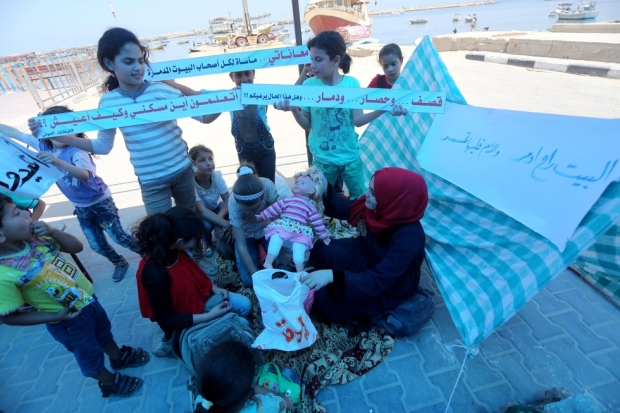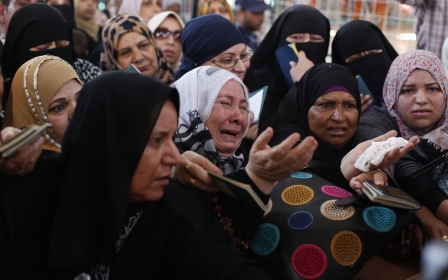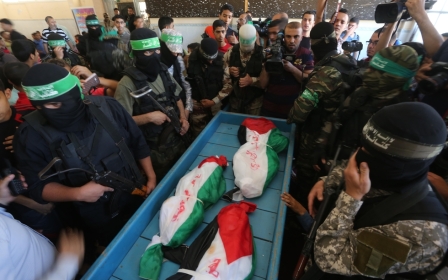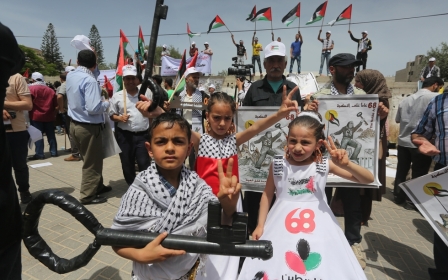Gazans fear for children's futures after 10 years under siege
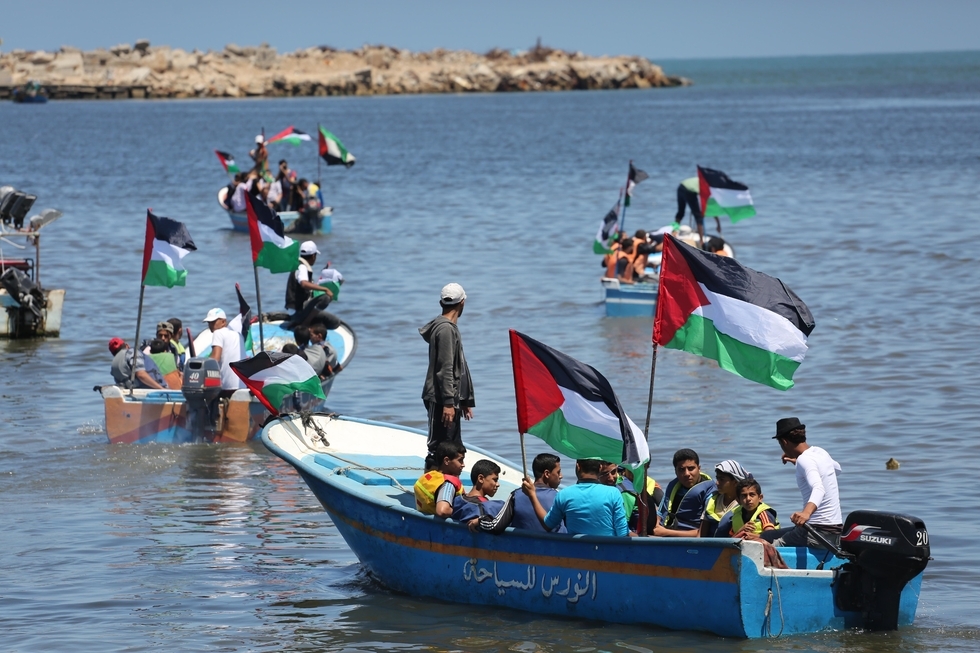
GAZA CITY – More than 10 years since Israel first imposed a crippling blockade on Gaza, the strip’s 1.8 million-plus residents say they have had as much as they can take and are increasingly worried for a new generation growing up knowing nothing but war, deprivation and isolation.
“It’s now 10 years of Israeli siege on Gaza,” Abu Maher, a 62-year-old fisherman sitting by Gaza’s fishing harbour, told Middle East Eye.
“The problem is not with us, we have seen enough wars in our lives, but it’s the small blameless children who are born into a siege mentality, and naturally come to hate their prison guards.”
During the past decade, Gaza has endured three Israeli military assaults from land, sea and air that have left thousands of Palestinians dead, many more badly injured and maimed and much of the strip’s infrastructure and fragile economy in ruins.
Hundreds of people waving Palestinian flags turned out on Wednesday to mark the sixth anniversary of the raid in 2010 by Israeli commandos on the Mavi Marmara, a Gaza-bound Turkish aid ship, in which 10 activists were killed.
The protesters honoured their memories by throwing brightly coloured carnations into the Mediterranean as part of a worldwide week of events marking a decade of the blockade using the hashtag #EndGazaSiege.
The blockade is generally considered to have begun when economic sanctions were imposed by Israel and the Middle East Quartet – made up of the US, the UN, the EU and Russia – in response to Hamas’s victory in the Palestinian elections in January 2006, although restrictions were further tightened when Hamas seized control of Gaza in 2007.
Among the protesters were lots of young children holding placards denouncing the blockade, which is all they have ever known.
Rahaf, a nine-year-old boy, marched largely in silence while holding a banner saying his “suffering is the tragedy of all homes that have been destroyed”.
The demonstrators assembled on the same location where thousands of Gazans waved similar flags in 2008 to welcome one of a number of Free Gaza aid boats which did succeed in breaking the blockade in that year.
Abu Maher remembers that day as a good moment, one when he felt the stoic pride of Gaza was protected and defended by the international activists who cared enough to risk their lives to bring basic humanitarian aid and send a message of support for the enclave’s besieged people.
Since then, there have been several more efforts by international activists to break the siege by entering Gaza by sea, but all have been repelled by the Israeli navy.
Now the strip’s residents say they increasingly feel isolated and alone. Three wars have also destroyed tens of thousands of homes and devastated Gaza’s social fabric, leaving children orphaned and wives widowed.
Psychiatrists say that cases of post-traumatic stress disorder (PTSD) among children have doubled since 2012 and other kinds of traumas and mental issues are also on the rise.
NGOs also report an increase in gender-based violence, with Action Aid and other humanitarian groups offering support to women affected by the conflict and in need of legal counselling.
'Our jailers neither let us die, nor flourish'
Meanwhile, the siege remains as tightly enforced as ever. At the Erez crossing with Israel, only humanitarian workers and those with special permits, such as a few Palestinian businessmen who deal with Israeli companies, are able to come and go.
A few hundred Palestinians requiring urgent medical treatment or those with permission to study abroad have also been permitted to leave.
Rafah, Gaza’s other main land crossing, to Egypt, has also been largely closed since the 2006 election, although controls were relaxed in 2010 following the Mavi Marmara attack by Israel on an aid flotilla, with 167,000 people allowed to cross that year compared with 60,000 in 2009.
After the 2011 revolution in Egypt and the subsequent election of Egyptian president Mohamed Morsi, Gaza briefly won more freedoms, and 257,000 Palestinians were able to cross in a single year.
Those numbers fell sharply after Morsi was ousted in 2013, and last year Rafah was open for just 21 days.
The Geneva-based Euro-Mediterranean Human Rights Monitor says that the blockade has doubled the level of human suffering in Gaza, where six out of every 10 families are now believed to be short on food and are classified as nutritionally insecure.
The United Nations has already warned that conditions in Gaza will be unlivable by 2020.
Umm Fouad Jaber, a 42-year-old Gaza resident, told MEE that people simply did not know what to do anymore and that the only way they felt they could continue to resist was to stay and defend their ancestral lands.
“Our jailers neither let us die nor flourish,” she said.
Jaber said that things had deteriorated so much under the blockade that clean water was now hard to come by. Shortages are widespread, and when water does drip out of the taps there is no way of knowing if it will be clean or dirty.
Power is also a rare commodity, with families not knowing when they will receive a few hours of power, only to be plunged into darkness again.
Marwan Karam, a supermarket owner, told MEE that getting even basic supplies in was extremely hard and that it could often be even harder to get customers.
With the blockade being held partially responsible for Gaza’s rocketing unemployment rate, which officially stands at 40 percent but is widely believed to be much higher, few can afford to pay for the goods they desperately need.
Many shopowners have for years been allowing friends and neighbours to eke out an existence by extending large lines of credit that they only half expect will ever be repaid.
“Gaza is like an acutely ill patient kept alive on a few drops of IV fluid; not enough to nourish, but enough to be kept alive to avoid the label of cruelty and neglect,” he said.
Israel insists the blockade is a necessary security precaution in response to the threat to its borders posed by Hamas and other Gaza-based militants.
But Richard Falk, the former UN special rapporteur on Palestine and now chairman of board of trustees at the Euro-Mediterranean Human Rights Monitor, told MEE that the siege of Gaza amounted to a form of “collective punishment” enforced by Israel on a helpless civilian population.
"No ordeal of human suffering is more an affront to the conscience of humanity than the decade-long blockade imposed by Israel on the people of Gaza,” said Falk.
“This continuing human rights abuse is a lethal and massive instance of collective punishment afflicting an entrapped civilian population. The blockade has also borne witness to the helplessness and complicity of the international community, including the United Nations."
Yet despite growing awareness of the plight of Gaza’s residents, people living with the effects of the occupation say they feel as though they have been utterly forgotten.
Recent moves towards reconciliation between Israel and Turkey, who fell out over the Mavi Marmara raid, in which eight Turkish nationals were killed, have left many fearful that Ankara will renege on its demands for the blockade to be eased, even while other Arab countries – including Egypt, Jordan, and several Gulf states – continue to grow closer to Israel.
At Gaza’s harbour where activists gathered to mark the official start to commemorations, children carried pictures showing signs of despair and deprivation.
“No to hunger, yes to lifting the blockade,” said a banner held up by an eight-year-old girl.
Abu Maher, the fisherman, called for her voice and those of thousands of others to be heard saying that Gaza’s children were “desperate for a better future”.
“We should build bridges of understanding between nations, but for that to happen the borders should be opened,” he added.
New MEE newsletter: Jerusalem Dispatch
Sign up to get the latest insights and analysis on Israel-Palestine, alongside Turkey Unpacked and other MEE newsletters
Middle East Eye delivers independent and unrivalled coverage and analysis of the Middle East, North Africa and beyond. To learn more about republishing this content and the associated fees, please fill out this form. More about MEE can be found here.


